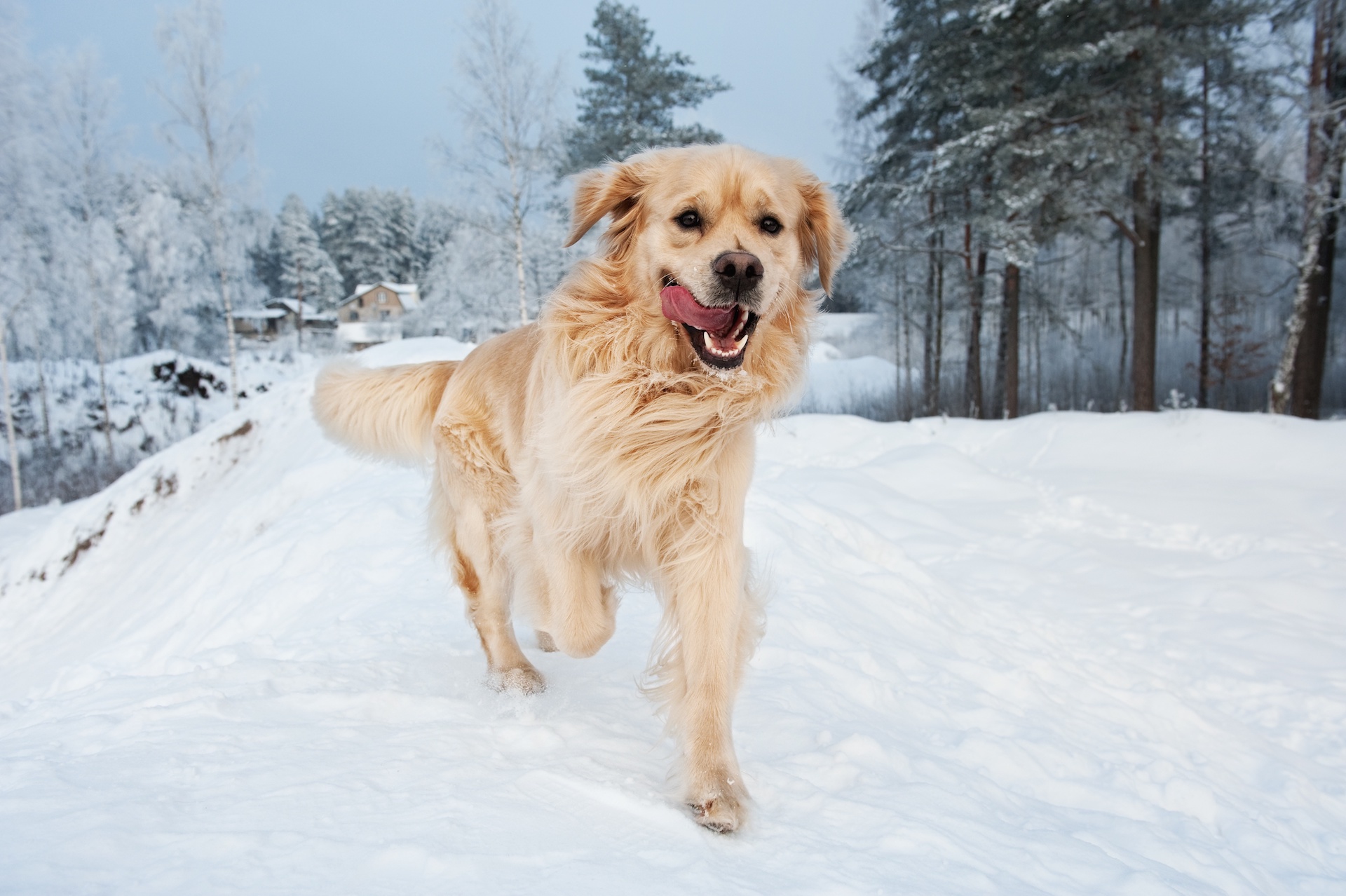The short answer is yes, Golden Retrievers do like snow. They like playing and rolling around in it – but you’ll need to make sure that they don’t eat any of it! Their long double-coats will keep them warm, and they can burn a bunch of energy racing around.
But before you let your Golden Retriever play in the snow for the first time, there are a few things you should do such as checking the conditions and watching out for signs that they’re too cold. It’s extra important to make sure your Golden Retriever doesn’t get too cold because they could catch hypothermia, and in the worst cases it can be fatal.
Read on for more tips and everything you need to know before letting your Golden Retriever play in the snow.
Why Do Golden Retrievers Like Snow?
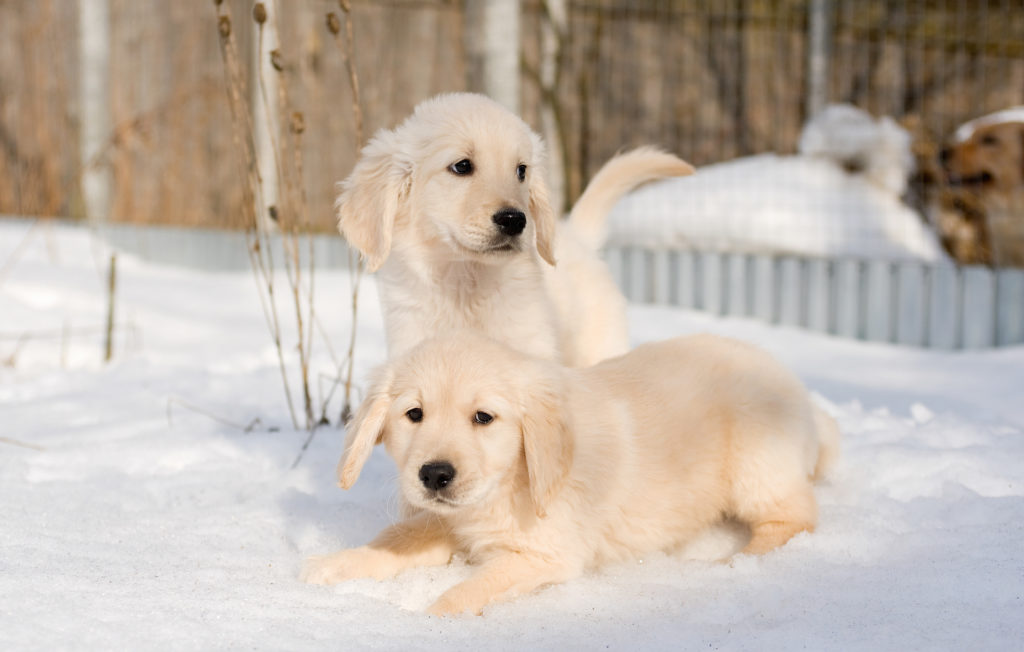
Golden Retrievers are fun-loving, curious dogs – quite like children. They love playing, and snow provides a perfect opportunity to roll around, chase snowballs, and dive into piles of snow.
If you live somewhere that rarely gets snow, it’ll be a novelty for your Golden Retriever to see it. Their first time seeing snow will be an occasion they’ll never forget. Even Goldies that live in snowy countries will be excited at the first snowfall of the year.
The snow also keeps them cool while they’re playing. After an intense time of having the zoomies, the cool weather will help them to avoid over-heating.
Reasons Why Golden Retrievers Might Not Like The Snow
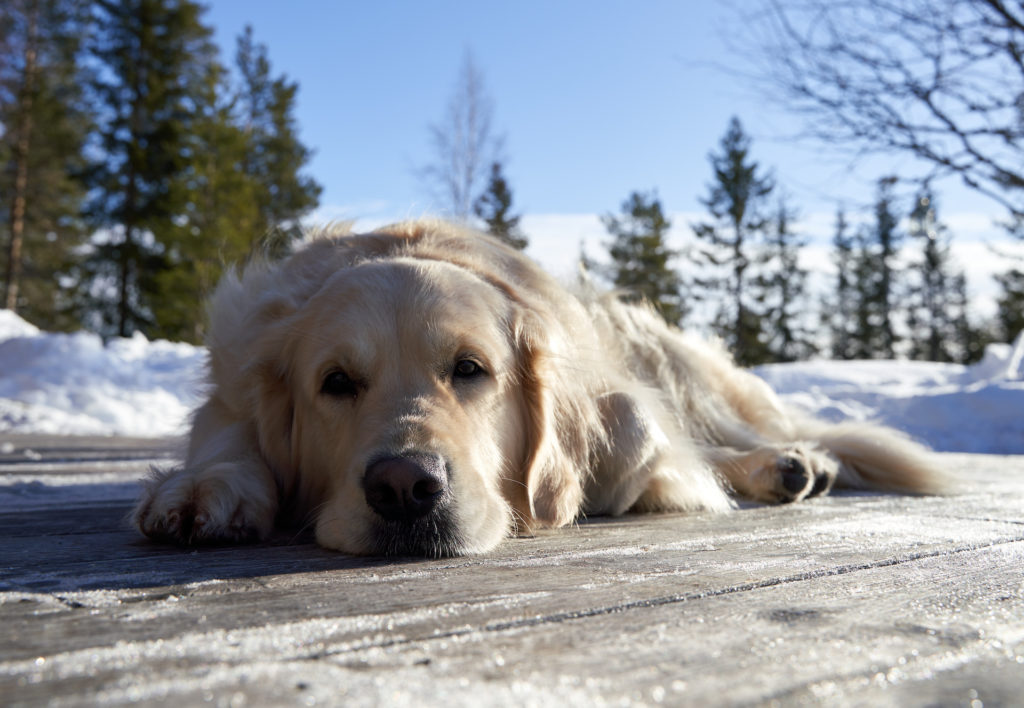
Not every Golden Retriever will like playing in the snow – it could be purely down to their personality that they don’t like it. Some Goldies weren’t socialised as pups and won’t be as bothered about playing so the snow won’t have a massive appeal.
Golden Retrievers might also dislike the snow, or grow to dislike the snow over time. This could be if elderly Goldies have poor vision and struggle to smell things when it’s blanketed in white. If they’re sick or in pain, they’re also likely to lose interest in it.
It could also depend on the snow itself. Powdery light snow is far more enjoyable than icy, wet snow. If it’s the colder snow, it might be too cold or painful for them. Deep snow can also result in them getting stuck and will be far harder to move through.
Another potential issue related to Golden Retrievers being in the snow is if their paws become cold and sore. Spending too long on the ice can cause their paw pads to become dry and cracked. Salt and chemicals used to melt the ice can cause burning sensations and are toxic if they lick it off their paws.
Snowballs – this is when clumps of heavy, wet snow stick to your Golden Retriever, forming balls of snow on their paws or body. This is uncomfortable and can weigh them down as well as make them cold. To remedy this, carefully use a hairdryer or warm towel to melt the snow. You can also get a coat and boots for them to wear outside to help avoid snowballs.
When Introducing Your Golden Retriever to Snow for the First Time
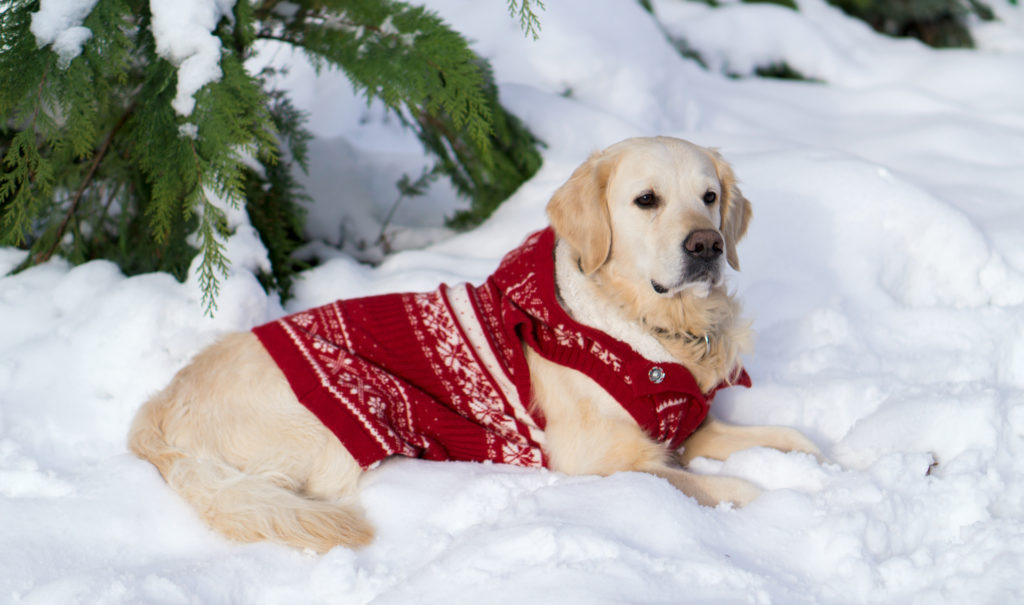
The first snow your Golden Retriever sees will be an exciting time for them and you. But before you let them go explore the white blanket that’s covering the world, make sure you check a few things:
- Check the conditions: Pay attention to the depth of the snow and whether there’s any ice underneath that can cause an injury.
- Take cues from your Golden: While most will find snow delightful, the odd one or two might not like it. If your Golden Retriever doesn’t like the cold, don’t force them to spend more time than necessary in it.
- For their first time, limit the time: Short but frequent visits to the snow are best here. As they get used to it, you can increase the time.
- Do they need an extra layer? Young puppies, elderly, and vulnerable Goldens are more at risk of catching a chill.
- Watch out for injuries: There’s a chance of broken bones, sprains, cuts, or any sort of problem.
- Look out for signs that they’re too cold: Such as shaking or crying. Check out the full list below.
- Have fun! Take photos, throw snowballs, and enjoy the experience with your Golden.
As long as you prioritize their health and safety, they should have an excellent time seeing and interacting with snow for the first time.
Signs Your Golden Retriever Is Too Cold
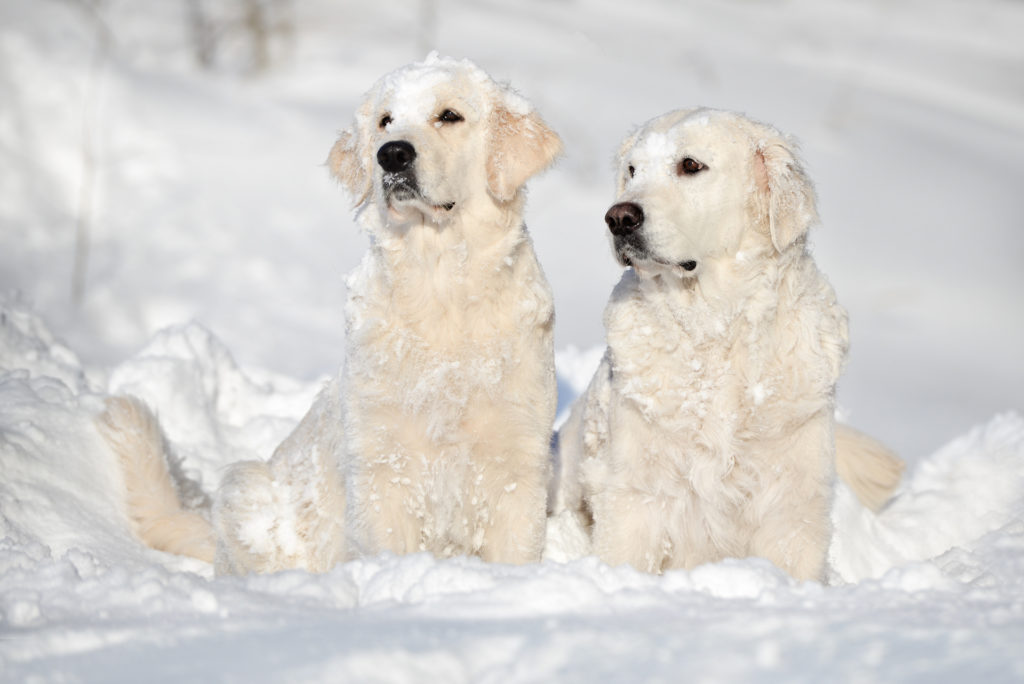
It’s important to closely monitor your Golden Retriever when they’re outside in the snow because they’re at risk of becoming too cold and developing conditions like hypothermia.
Signs that your Golden Retriever is too cold:
- Shaking and shivering.
- Sitting in a hunched position with their tail tucked in.
- Crying, whining, or barking.
- Lifting their paws off the ground.
- They’re trying to get to shelter out of the snow.
- Anxious or uncomfortable behaviour.
Limit your Golden Retriever’s time in the snow, and get them inside and warmed up as soon as you notice any signs of them getting cold. In the worst cases, hypothermia can be fatal.
Signs of hypothermia in Golden Retrievers:
- Slow, shallow breathing.
- Weakness.
- Lethargy.
- Muscle stiffness.
- Poor mental ability.
- Fixed, dilated pupils.
- Loss of consciousness.
If your Golden Retriever is showing any signs of hypothermia, get them to a vet ASAP. Make sure that you get them out of the snow as soon as you realise that they’re having a problem.
Tips for Keeping Your Golden Retriever Safe in the Winter
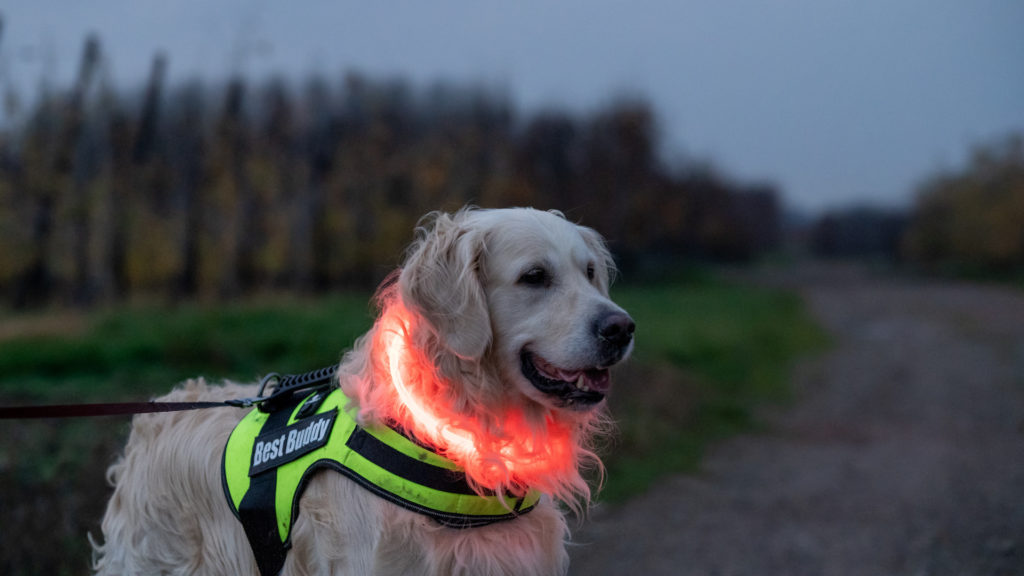
In general, winter is as equally fun as it is dangerous for dogs. But there are a few things you can do to ensure that your Golden Retriever is as safe as possible during the cooler, darker days.
In winter:
- Never leave your Golden Retriever unsupervised: Even though it’s far more tempting to let them out while you stay indoors where it’s warm, you must always watch out for injuries, signs of getting too cold, or problems.
- Make sure your Golden Retriever isn’t too cold: As mentioned above, it’s easy for Goldens to catch a chill, and it can lead to hypothermia. Make sure you limit the time so they aren’t out for hours on end.
- Don’t overly groom your Golden Retriever: This means being careful not to trim their hair too short and never shaving them – their double coat is keeping them warm as the temperature drops and they’ll struggle without it.
- Wash their paws after they’ve been outside: This cleans any salt, antifreeze, or chemicals off their paws before it irritates their skin. It also reduces the chance of your Golden Retriever licking and ingesting something that they shouldn’t.
- If you spill antifreeze, clean it up immediately: If you spill any, clean it before your Goldie ingests any of the toxic liquid. If you regularly use antifreeze, try getting a nontoxic version with propylene glycol instead of ethylene glycol.
- Don’t let them outside if they’re wet: After bath time, you shouldn’t let your Golden Retriever go outside for the toilet or playtime until they’ve completely dried. Bathing should be indoors instead of outdoors in the winter too.
- Don’t leave them in the car in the winter: Cars hold temperature – making them freezing in the winter and boiling in the summer.
- Make sure they have a warm, secure, comfortable place to sleep: This includes making sure they aren’t in a draft, that the temperature in the whole house isn’t too low, and anything you can provide for comforts like a bed or blanket. If they usually sleep outside in a kennel, then it’s time to bring them in for the winter.
- After a busy day of playing in the snow, they’ll need decent food: After burning so many calories, they’ll need to replenish them and eat a healthy meal.
- Consider safety when walking in the dark: If you’re walking in the dark or fog, it’s a good idea to wear reflective clothing and perhaps have a light on your Golden Retriever’s collar. This makes it easier for others to see you.
- Dog-proof your house: This includes having a barrier in front of an open fire, and making sure heaters are safe if accidentally knocked over. A cold Golden could instinctively cuddle closer in the night and accidentally get burnt.
- Keep your Golden Retriever hydrated: Even if it isn’t warm, you’ll need to make sure your pet has plenty of drinking water. If it’s cold, watch out for the water freezing.
The main thing to take away here is keeping your Golden Retriever warm and safe in the winter.
Related Questions
Do Golden Retrievers Need Snow Boots?
No, Golden Retrievers don’t need to wear snow boots, but if you live somewhere where the pavements have been salted, you might want to get some boots to protect their paws. If they don’t like wearing boots, look for wax or something else that can go on their paws pads to protect against ice, snow, and salt.
Do Golden Retrievers Need Sweaters or Coats in Snow?
No, the average Golden Retriever shouldn’t need sweaters or coats in the snow – they should be able to manage without any extra layers. Their thick double-coat should be enough to keep them warm in the snow. Only consider a jumper if you have a puppy or elderly Goldie whose health is frailer.
How Cold Is Too Cold to Walk a Golden Retriever?
For smaller dogs, once the temperature drops below 7 degrees celsius (40F), it’s too cold to walk them outside. Golden Retrievers are a medium to large breed and can tolerate slightly cooler temperatures but the general advice would be to not walk them if it’s colder than 7. Walking in the cold can lead to frostbite and hypothermia.
Do Golden Retrievers Need a Blanket at Night?
If it’s particularly cold, your Golden Retriever will appreciate a blanket at night. The extra layer adds to their comfort and warmth so is always a good idea. This isn’t something that you have to do, but it’s a nice touch. Some people choose to let their Goldies sleep in the same bed as them, but it’s entirely your choice.
Can Golden Retrievers Swim in the Winter?
Yes, a well-trained Golden Retriever can swim in the winter. They can swim in any season, but you’ll need to monitor them and judge whether they’re getting too cold or starting to struggle. They’ll lose body heat faster in cold water so be extra careful to warm them up after and watch for signs of problems related to the cold.
